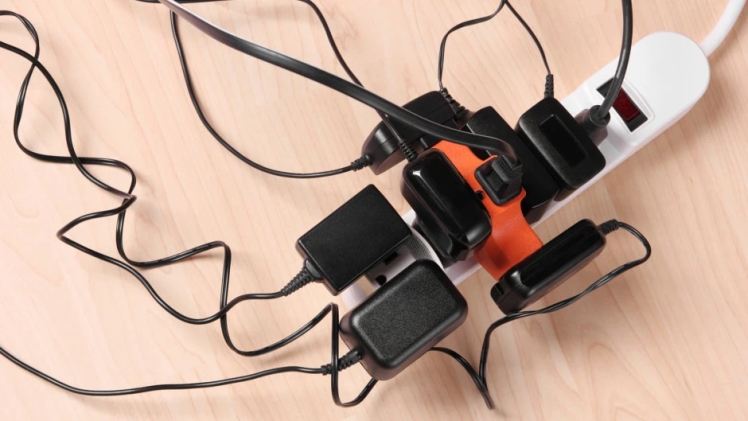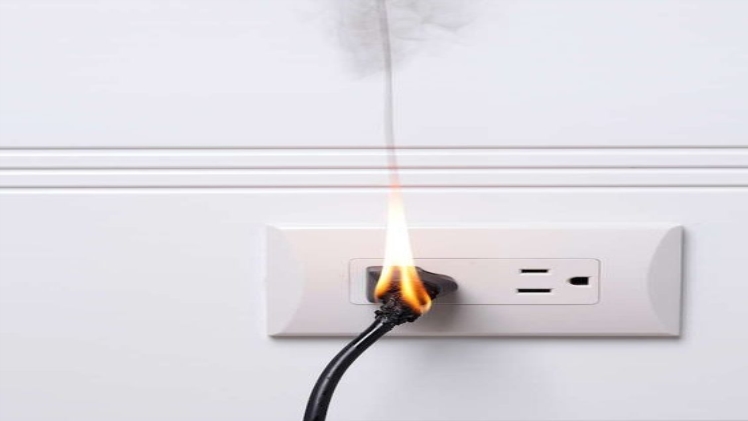Source:https://www.pinterest.com/pin/15129348739102928/
In our daily lives, we use a range of electrical gadgets at home. The gadgets are mainly used for cooking, cleaning, entertainment and for warming our houses. Basic electrical safety procedures are often overlooked, resulting in accidents, injuries, fires, and even death.
The goal of electrical safety is to create a safe environment where injuries caused by electrical contact can be avoided. While electrical safety is particularly crucial for electricians, it is also important for everyone else.To keep your family safe from electrical dangers, keep the following suggestions in mind.
Damaged, cracked, loose, or faulty power cords should be repaired or replaced.
Source:https://www.pinterest.com/pin/766315692824302463/
Alt-Text: Damaged Power Cord
At home, electrical safety precautions are things you do to avoid being injured by an electric shock. This includes light fixtures and extension cords, as well as all other items in your home. Appliances such as clothes dryers, dishwashers, ovens/stoves, and refrigerators are also covered in this area.
Damaged power cords are one of the most common electrical risks in homes. Extension cables should be handled with attention because they can easily become tangled in furniture or walked over by anyone while carrying out their normal chores. The result will be a short-circuit and electrical shock. All your communication cables should be well tucked for the safety of kids and any other person at home.
Always Follow The Appliance’s Instructions.
Every appliance manual contains instructions on how to use the equipment properly. When putting together a new toy for your child or grandchild or connecting various parts of an electrical equipment, read the directions carefully and follow them step by step to avoid any potential dangers. Also use the equipment as instructed in the manual and not any other way.
A frayed or damaged extension cord is one of the most common electrical risks. Extension cords should never be run through carpets. They are also rarely designed to carry large weights for more than a few feet. If you must use an extension cable with evident wear and tear, make sure it is placed beneath furniture so it does not come into touch with the floor. But that is not advisable.
Keep Water Away From Your Electrical Appliances
This rule of thumb should always be followed to the letter. Using appliances near water sources, it could be from running taps in the bathroom or kitchen, is a typical cause of electric shock. Use a waterproof wall mount box to keep your electronics safe. Do not attempt to remove or pull out a plugged-in gadget that has fallen into water.
To avoid an electrical short circuit, your first move should be to go to your home’s electric panel board and turn off the power. Then you may securely unplug and dry your equipment. However, use caution before plugging in any electrical equipment. You should start by ensuring that it is entirely dry and ready to use.
Unplug any appliances that aren’t in use.
Make sure that you unplug appliances that aren’t in use all the time. For example rice cooker, iron box, hair straightener, and a blender. Make sure to keep the power cords and the electrical equipment out of reach of youngsters and pets.
Consider unplugging energy-sucking equipment like modems, PCs, and chargers if you’re going on vacation. This will save you from paying large bills and also protect your appliances from damages. You can also use solar lights to cut down on the monthly electricity costs.
Always avoid overloading the electrical system.

Source: google
There are other ways that you can prevent electrical problems from occurring other than keeping an eye out for them. To begin, learn how much an electrical outlet can handle and how to keep your system from being overloaded. Because most outlets can only handle 15 to 20 amps of power.
So it’s very critical that you monitor the power level of each item.We understand how tempting it is to add another plug to that surge protector, but that’s not safe at all. Overloaded systems are one of the most common causes of the failure of appliances to work.
Keep Combustible Items Away From Electricals
There are some appliances which are considered more hazardous than others, for example Portable electric space heaters. But generally all electrical appliances can turn out to be unsafe in the house at any time. Equipment like irons, hair dryers, and even lamps can still cause electrical fire.
When any of these electrical items come in touch with flammable materials, such as blankets, towels, or carpets, they might cause a fire. Cables, especially extension cords, should not be hidden under rugs or carpets. They can quickly catch fire if they become overheated.
Conclusion
Electricity has had the greatest number of interventions in all aspects of life, making our lives easier. However, we are equally responsible for balancing the results by ensuring sufficient safety. Following the above electrical safety recommendations will save us a lot of time and effort. You will also be safe from any electrical shock or fire.



